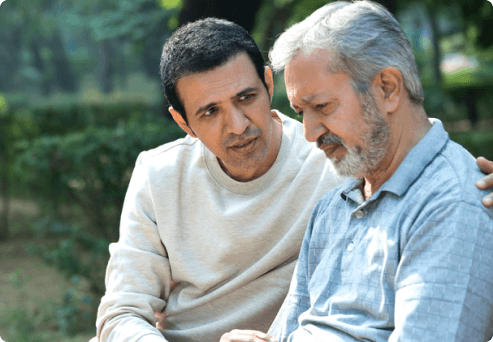Get Your Free Mesothelioma Guide

Find a Top Mesothelioma Doctor

Access Help Paying for Treatment

Mesothelioma caregiver conflicts can contribute to feelings of stress, anger and resentment. There are ways to manage these feelings, resolve conflicts and reduce stress.
The struggles facing mesothelioma caregivers typically involve disputes among family members, stress around providing care and coping with difficult emotions such as guilt and resentment.
Mesothelioma caregiver conflicts usually involve family members with differing opinions about the best way to care for a loved one. These conflicts are a significant source of stress. Most people struggle to resolve these conflicts because they are so emotionally charged.

The overall strain of caring for someone with mesothelioma can lead to feelings of anger and resentment. Some caregivers feel guilty for experiencing these feelings and wonder if it makes them a bad caregiver. It doesn’t. Every caregiver copes with deep feelings of anger and resentment.
Understanding how common it is for families to experience conflicts, and how normal it is to feel difficult feelings about caregiving, helps caregivers accept and process what they are going through.
With the right guidance, help and support, mesothelioma caregivers can get through this difficult time.
Get Your Free Mesothelioma Guide

Find a Top Mesothelioma Doctor

Access Help Paying for Treatment

Resistance to change is a normal and common response following a mesothelioma diagnosis. Consider the following approaches when your loved one refuses or resists care:
Admitting that you need help involves recognizing that you are losing your abilities. If your loved one feels like they’re becoming helpless they may resist care to gain a sense of independence. Finding ways to integrate help and support over time and helping them feel empowered as much as possible can make adjusting to life after a mesothelioma diagnosis a little easier.

Receive a recording of our webinar that explores effective coping strategies after a mesothelioma diagnosis.
Get a RecordingCaregivers cope with feelings of resentment and anger. Consider the following tips for managing these feelings:
It’s important to take time to be kind to yourself as a caregiver. A 2021 research study suggested that psychological distress experienced by caregivers of malignant mesothelioma patients was related to the traumatic experience they endure while providing care for the disease.
It is common for siblings to experience conflicts about providing care to their parent with mesothelioma. These conflicts typically involve:
Solutions for these conflicts involve a lot of communication, openness and patience.
Siblings who struggle to find solutions that feel fair should reach out to a mediator, care manager, social worker or mental health therapist. Working with one of these professionals can help siblings reach agreements that feel fair and appropriate for the problems at hand.
Spouses caring for their partner with mesothelioma may experience intermittent or lasting resentment and anger.
These feelings may arise from different caregiver struggles or interpersonal conflicts with your loved one:
Solutions involve rebalancing the relationship as much as possible.
Spousal caregivers should consider hiring a caregiver to help with the most difficult tasks. This step may foster more quality time spent together and help the couple reconnect with how their relationship used to feel. Doing things together to promote intimacy helps couples coping with lack of sex drive.

Free online support group helps patients and families cope with the emotional effects of mesothelioma.
Sign Up NowFamilies that come together to care for a loved one with mesothelioma may experience conflicts as they establish the caregiving roles everyone will play.
Maintaining clear communication regarding everyone’s concerns and needs helps families establish clear roles. Staying flexible and open to change fosters a dynamic that helps caregivers respond well if established roles shift.
Consider creating a care plan that outlines the caregiving needs of the mesothelioma patient. Primary and secondary caregivers can then agree upon who will take responsibility for the different roles.
Mediators are trained and licensed professionals who help disputing parties reach a resolution. Certain mediators are specially trained to help resolve family conflicts over caring for an elderly or sick parent.
You may consider hiring a mediator when family members cannot reach an agreement about caring for a loved one with mesothelioma.
Care managers are health care professionals who advise families on how to offer the best care to a loved one. They are particularly helpful to families that don’t have prior caregiving experience and don’t know where to begin.
Care managers also help resolve complex behavioral problems such as when a loved one refuses care. They can also help families sort out caregiving conflicts.
Caregivers experience feelings of guilt when they believe they aren’t offering the best care to their loved one. All too often, caregivers feel guilty for experiencing resentment or anger about their caregiving role.
This kind of guilt is difficult to shake because you’re judging yourself over unavoidable, imagined or simply natural and human faults.
Managing caregiver guilt involves giving yourself a lot of slack. Be gentle and easy on yourself. Try to become comfortable with the gap between your idealized vision and the reality of caregiving.
Many mesothelioma caregivers feel anticipatory grief.
While grief is typically considered a feeling that people experience after the death of a loved one, anticipatory grief is a kind of grief felt before a loved one passes.
Coping with anticipatory grief is challenging for people in a caregiving role. Sometimes feelings of grief arise suddenly and without warning, jarring caregivers into a difficult emotional state.
Reach out to a trusted friend for support and make alone time for yourself to do activities you enjoy. Take deep breaths when feelings of grief come up and do something comforting, such as brewing your favorite cup of tea or taking a relaxing bath.
Processing emotional stress requires time and paying attention to feelings. Caregivers are often strapped for time and usually find themselves focused on the feelings of their loved one rather than their own feelings.
It’s important for caregivers to carve out time for themselves. Time spent away from caregiving allows caregivers to decompress and process how they feel.
Consider the following tips for processing emotions:

“After reading the guide, I felt more confident about what was ahead.” – Carla F., mesothelioma survivor
Get Your Free GuideCaregivers often report financial strain as a source of conflict and stress. Handling mounting medical bills and the cost of medical supplies and medication can be overwhelming.
Consider the following tips to cope with financial strain:
Spousal caregivers who are new to handling financial matters may lack confidence in their ability to take control of finances. An adult child in a caregiving role may struggle to take over their parent’s finances, or they may find themselves financially supporting their parent. But working with experts can help alleviate some of the anxiety around managing finances.
Many forms of support are available to caregivers. Consider the following tips to find support:
Even though you may worry that asking for help will make you a burden, ask anyway. Most people want to help; they just need to know what kind of help you need. With the right support, mesothelioma caregivers can overcome struggles and resolve family conflicts.
Recommended ReadingYour web browser is no longer supported by Microsoft. Update your browser for more security, speed and compatibility.
If you are looking for mesothelioma support, please contact our Patient Advocates at (855) 404-4592
The Mesothelioma Center at Asbestos.com has provided patients and their loved ones the most updated and reliable information on mesothelioma and asbestos exposure since 2006.
Our team of Patient Advocates includes a medical doctor, a registered nurse, health services administrators, veterans, VA-accredited Claims Agents, an oncology patient navigator and hospice care expert. Their combined expertise means we help any mesothelioma patient or loved one through every step of their cancer journey.
More than 30 contributors, including mesothelioma doctors, survivors, health care professionals and other experts, have peer-reviewed our website and written unique research-driven articles to ensure you get the highest-quality medical and health information.
My family has only the highest compliment for the assistance and support that we received from The Mesothelioma Center. This is a staff of compassionate and knowledgeable individuals who respect what your family is experiencing and who go the extra mile to make an unfortunate diagnosis less stressful. Information and assistance were provided by The Mesothelioma Center at no cost to our family.LashawnMesothelioma patient’s daughter


Whitmer, M. (2025, June 5). Struggles Facing Mesothelioma Caregivers. Asbestos.com. Retrieved July 10, 2025, from https://www.asbestos.com/support/caregivers/struggles/
Whitmer, Michelle. "Struggles Facing Mesothelioma Caregivers." Asbestos.com, 5 Jun 2025, https://www.asbestos.com/support/caregivers/struggles/.
Whitmer, Michelle. "Struggles Facing Mesothelioma Caregivers." Asbestos.com. Last modified June 5, 2025. https://www.asbestos.com/support/caregivers/struggles/.
Michelle Whitmer has covered science and medicine for Asbestos.com for more than 15 years. She has been featured in multiplatform media, including The New York Times and KYW Newsradio. Whitmer is pursuing American Medical Writers Association certification, has completed OSHA Asbestos Standard for the Construction Industry training and is CDC certified in Health Literacy.
Our fact-checking process begins with a thorough review of all sources to ensure they are high quality. Then we cross-check the facts with original medical or scientific reports published by those sources, or we validate the facts with reputable news organizations, medical and scientific experts and other health experts. Each page includes all sources for full transparency.
Please read our editorial guidelines to learn more about our content creation and review process.
